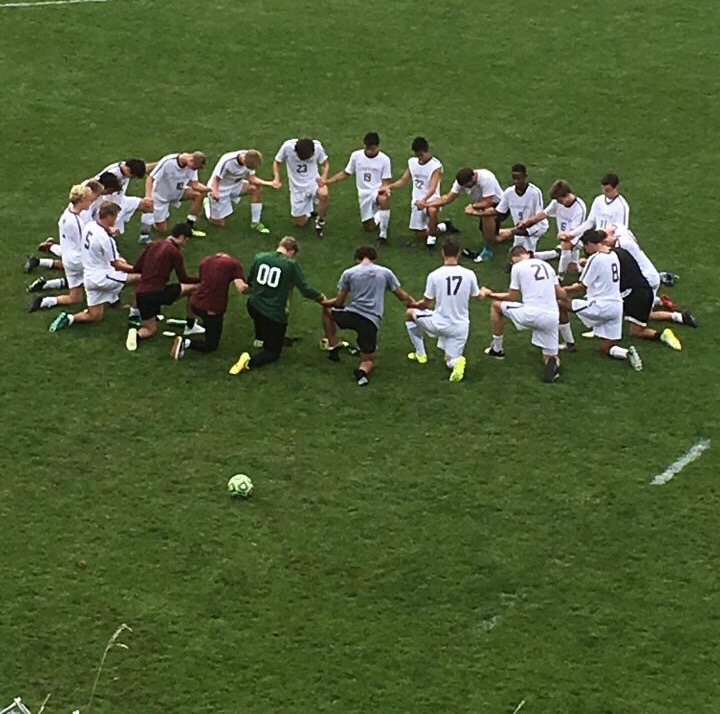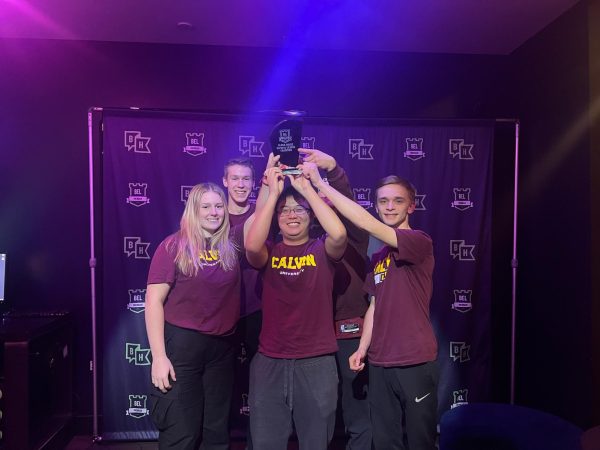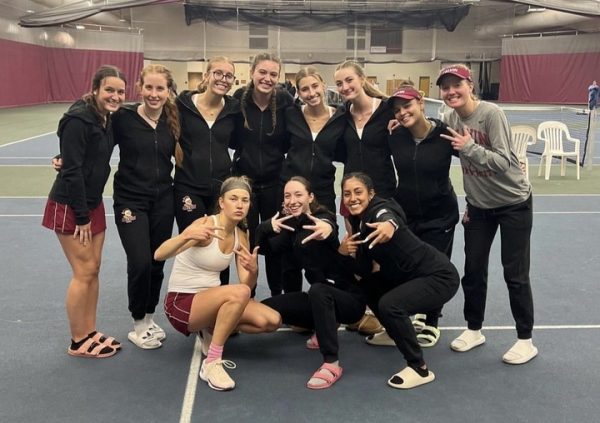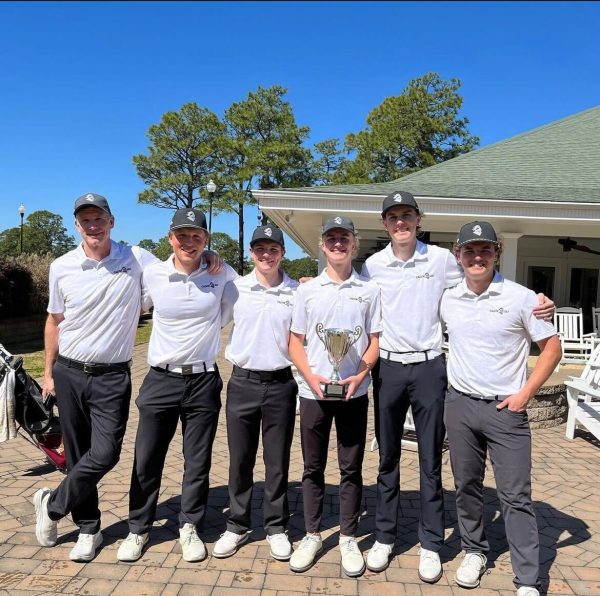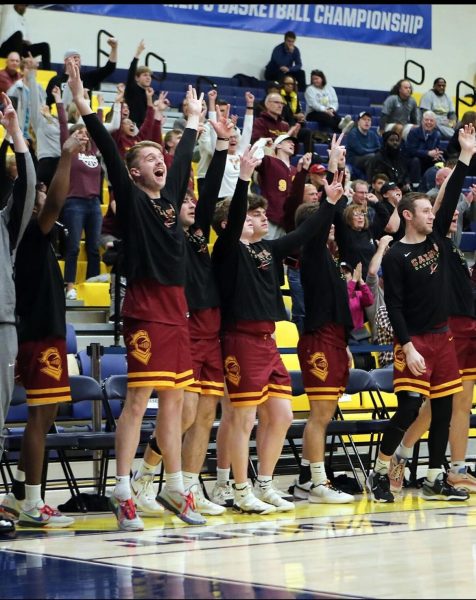JV soccer makes the most of five-game season
Transition to club soccer possible in coming years
Calvin’s junior varsity soccer team often flies under the radar, but this season was especially easy to miss: after five games, it was over. Cancelled games, along with several other pandemic-induced difficulties, made it a difficult season for coach and players alike to navigate, but the team found ways to make it a success. With new plans in the works behind the scenes in the athletic department, brighter days could be ahead for non-varsity soccer at Calvin.
An atypical season
The team had a typical slate of games planned with eight to 10 games scheduled, but only five of those ended up being played, for a variety of reasons. Multiple games were cancelled due to weather, while another was called off because of COVID cases on the opponent’s squad. Additionally, some of Calvin’s traditional JV opponents are schools that have implemented vaccination requirements for their students, and these schools chose not to play against schools with less strict requirements for their athletes.
“[The season] was just a huge administrative pain in the butt,” said Coach Hosanna Fukuzawa, noting the difficulties the team had getting games scheduled and players registered and tested so that they could play.
The team made the most of difficult circumstances, though, tying one game and winning the other four, two of which saw Calvin pick up the decisive goal in the last few minutes of play.
Along with the wins, the team built steady camaraderie as it played and practiced together.
“We had a great group of guys, a lot of fun to be around, so practice — that was probably the highlight of my day,” said senior Chris Singh, who played on the team for all four of his years at Calvin.
“We had a lot of freshmen, sophomore guys who had never experienced JV really before, and just to see them power through, work hard — it was a really great group of guys,” added Eli Ribbe, a senior captain.
“As many problems as we had, I think in general the kids really made it a great season,” Fukuzawa said. “They made it as efficient and worthy of everyone’s time as I wanted it to be … They stuck with it, they put in the work, so I was really happy with all that.”
Still, extenuating circumstances left some things to be wanted.
“It felt like as soon as [the season] started it was over,” Singh noted. The five games that Calvin was able to play all happened at home, meaning that players missed the experience of going on the road like upperclassmen had in past years.
Aside from the games themselves, the team had trouble getting practices in, finding themselves in line behind Calvin’s two varsity soccer teams and two varsity lacrosse teams when it came to scheduling practice fields. During the fall 2020 season, JV soccer moved its training sessions from the athletic department facilities to Phi Chi Field behind the Knollcrest East apartments.
“I think if I was a player, it would’ve been a hard season, just because it just felt like not many people cared about us,” Fukuzawa said.
COVID Difficulties
Many of the season’s difficulties traced back to the pandemic. High demand for a limited number of tests last year made it difficult for JV players to be tested consistently, and sports seasons like lacrosse and soccer, which traditionally don’t overlap, were happening at the same time due to rescheduling because of the pandemic, creating higher demand for COVID tests, scheduling resources and practice fields.
On top of that, the supply of rentable vans has been drastically reduced after rental agencies sold their vehicles during the pandemic, making away games a near-impossibility. The limited supply of referees to officiate games also inhibited the team from playing.
In spite of this, Calvin’s JV team has managed to have two COVID-impacted seasons that have looked a lot closer to normal than other schools’ JV programs. Although it didn’t play any games in fall 2020, Calvin’s JV team was able to train for three weeks and have regular COVID testing when other schools cancelled their JV seasons altogether.
“Between the COVID policies and the field availability, it just was a lot of work to pull off, but we were glad that we got the three weeks that we did,” said Ribbe.
More generally speaking, Calvin’s JV program has access to many more resources than other schools’ JV teams, from equipment like new jerseys and soccer balls to resources like athletic trainers and practice fields. In past seasons, the team has often taken a bus to away games, with one trip costing double what other schools spend on their JV teams, according to Calvin Athletic Director Jim Timmer.
A new program to further old goals?
Calvin has junior varsity programs in several sports, many of which have been around since the 1970s and 80’s, when most of the surrounding schools had JV programs as well. Since then, a lot of schools have dropped their JV programs in favor of larger varsity squads.
“As the landscape of Division III has changed, very few kids want to be recruited to JV soccer. They want to be recruited to varsity soccer,” said Timmer.
Instead of having both a JV and varsity team, many schools nowadays choose to have only a varsity team that has more players than a typical varsity team would have in past decades. In some cases, the reserves from that larger squad may play in games against reserves from other schools’ teams to provide players with game action.
Athletic directors like Timmer are having to consider what model provides the best opportunities for student-athletes — is it worth giving more players the opportunity to experience varsity sports even if it means they may not see as much playing time, or is it better to offer players the chance to compete consistently at the JV level before getting the chance to try out for varsity?
Calvin’s not the only school grappling with this question, as the JV team’s schedule every year demonstrates — the team plays a combination of JV teams from other schools and reserve squads from other schools’ varsity teams.
For players like Ribbe, having a JV team instead of a varsity team with lots of reserves is immeasurably meaningful because of the opportunities it provides.
“Most of those schools there’s probably 30, 35 guys that get to play collegiate soccer at their university, but for us, because we have a large varsity roster as well as an entire JV team, I think this year we had almost 60 guys playing collegiate soccer at Calvin, which is just why I love the JV program,” Ribbe said.
Moving forward, Timmer and others involved with Calvin athletics are seeking to keep the positive aspects of the JV team while avoiding some of the difficulties that often arise. Pursuing that balance could lead to an alternative option that doesn’t rely on a reserve-filled varsity team or a JV team in desperate search for other teams to play.
Calvin is considering transitioning the JV soccer program to a “robust club program,” according to Timmer. Offering soccer as a club sport could give students the opportunity to play intercollegiate soccer at a high level, while requiring a different level of commitment than both varsity and intramural teams would. Whereas the JV team has historically been intended for freshmen and sophomores, a club sport would be more open to four-year participants.
Adding men’s and women’s club soccer would also add a dimension that Calvin is currently missing — the university doesn’t have a JV women’s soccer team.
Club teams could work with the athletic department to obtain funding and find spaces to play, but would have more autonomy than traditional JV programs would, with their own coaches, website and training.
“I think that would be better for the players, too, because they don’t rely on the varsity schedule or the athletic department to schedule their games and all that,” Fukuzawa said. “They can structure things on their own and plan games and actually be part of a real league instead of just playing other JV teams.”
No final decisions have been made yet, but changes could be coming in the not-so-distant future.
“We’ve been asked to, with Provost Toly, to have some stuff to his desk by March on those concepts, so we’re moving quickly,” Timmer said.
A transition from JV soccer could serve as a test case for how club sports might work at Calvin, with the athletic department considering a “phased implementation” of several club sports, according to Timmer.
Regardless of how it plays out over the next few years, Calvin hopes to provide opportunities for students like Singh and Ribbe to build relationships and create memories while out on the field.
“That’s definitely the best part, is the relationships that are formed, and then getting to hang out and play with those guys throughout the year is a lot of fun as well,” Ribbe said.



